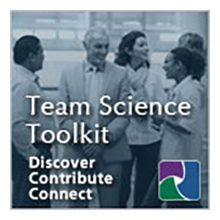- Home
- About
- Membership
- Special Interest Groups
- Conferences
- 2025 SciTS Conference
- 2024 SciTS Conference
- 2023 Scits Conference
- 2022 SciTS Conference
- 2021 SciTS Conference
- 2020 SciTS Conference
- 2019 SciTS Conference
- 2018 SciTS Conference
- 2017 SciTS Conference
- 2016 SciTS Conference
- 2015 SciTS Conference
- 2014 SciTS Conference
- 2013 SciTS Conference
- 2012 SciTS Conference
- 2011 SciTS Conference
- 2010 SciTS Conference
- Past SciTS Conference Photos
- Contact Us
SciTS 2011 Conference: SessionsTeam Research to Inform the SciTS (Keynote)Tuesday, April 12 • 8:30 AM - 9:30 AMTeamwork has become an obsession in many industries, agencies and organizations. Many of these deploy teams to handle their most difficult tasks, missions or goals. And so a science of team performance has emerged. But, what do we know about teamwork, team training and team effectiveness after several decades of research? What matters in promoting effective teamwork? What influences team effectiveness? This presentation will highlight what we know about the science and practice of teamwork so far. It will provide insights to those in research and those in practice as to what contributes to team effectiveness in organizations.
VideoWatch: Team Research to Inform the Science of Team Science Panelists
Eduardo SalasEduardo Salas, Ph.D., is University Trustee Chair and Pegasus Professor of Psychology at the University of Central Florida. He also holds an appointment as Program Director for Human Systems Integration Research Department at UCF’s Institute for Simulation & Training. Previously, he was a Senior Research Psychologist and Head of the Training Technology Development Branch of NAVAIR-Orlando for 15 years. During this period, Dr. Salas served as a principal investigator for numerous R&D programs focusing on teamwork, team training, simulation-based training, decision-making under stress, learning methodologies and performance assessment. His expertise includes helping organizations on how to foster teamwork, design and implement team training strategies, facilitate training effectiveness, manage decision making under stress, develop performance measurement tools, and design learning and simulation-based environments. He is currently working on designing tools, instructional strategies and techniques to minimize human errors in aviation, law enforcement and medical environments. He has consulted to a variety of manufacturing, pharmaceutical laboratories, industrial and governmental organizations. |

